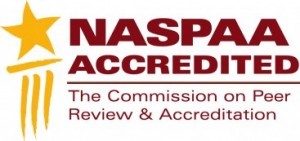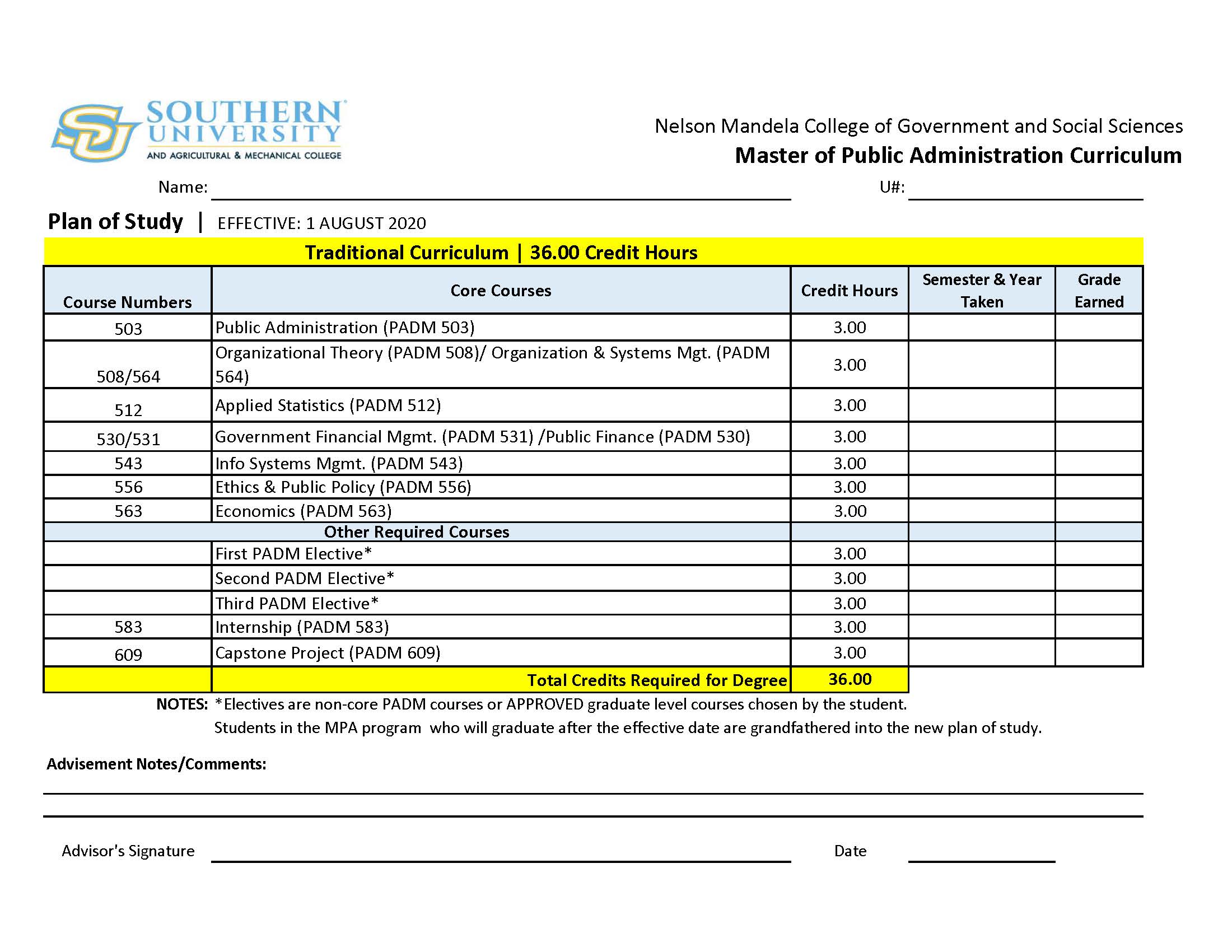Department of Public Administration
Graduate Program
Welcome to the Master of Public Administration Program
Greetings!
Welcome to one of the hallmark graduate programs in the Nelson Mandela College of Government and Social Sciences --the Master of Public Administration Program. The field of Public Adminisration is an indispensable part of society. The multi-disciplinary program is designed for the professional who desires to be a public servant. It is designed for individuals who desire to enact positive change for the greater good of society. Based on this premise, public administrators carry a special responsibility to know and understand what motivates people to action, how the decisions are made, and the challenges associated with change, conflict, diversity, and power. This program’s academic curriculum is designed to prepare leaders for a career in public service. In a climate of intensified cultural, racial, and social injustices; a global pandemic; and environmental crisis; the need to create, imagine and produce ways to create positive change for a better future is paramount. If any of these sentiments appeal to your academic, professional, or personal acumen we invite you to indulge us by scheduling a meeting to discuss the possibilities or simply enroll in our Master of Public Administration program.

Program Highlights:
- American Society of Public Administration-Louisiana Chapter Conference Host
- National Forum of Black Public Administrators Executive Leadership Institute Host Site
Learn more about the Master of Public Administration Program by visiting our website by clicking here or email us at mpa@subr.edu.
Message from the Chair

It is my distinct pleasure to extend a warm welcome to each of you as you embark on your academic journey in our Masters in Public Administration and Ph.D. in Public Policy programs. As Chair of the department, I am thrilled to witness the next generation of leaders and scholars stepping forward to tackle the complex challenges facing our society. Your decision to pursue advanced studies in public administration and policy reflects a commitment to effecting positive change and shaping the future of governance and public service.
Throughout your time in our programs, you will engage in rigorous academic inquiry, collaborate with esteemed faculty members, and interact with a diverse cohort of fellow students who bring unique perspectives and experiences to the table. Whether you are seeking to enhance your understanding of policy analysis, organizational management, or public finance, or aiming to conduct groundbreaking research that informs policy decisions, our faculty and staff are dedicated to providing you with the support and resources you need to excel in your studies and make a meaningful impact in the field of public administration and policy.
As you embark on this transformative journey, I encourage you to embrace curiosity, intellectual inquiry, and social justice. Together, let us seize this opportunity to advance the public good and contribute to building sustainable communities for all. Once again, welcome to our vibrant academic community, and I look forward to witnessing your growth, accomplishments, and contributions in the years ahead.
Warm regards,
Reva Hines, Ph.D.
Mission, Vision and Goals
Mission
The mission of the Master of Public Administration program at Southern University and A&M College is to provide quality education and training for graduate students and to develop leadership and management skills in public service.
Vision
The Master of Public Administration program at Southern University and A&M College, will provide a quality program with a comprehensive curriculum, innovative research, and service opportunities that will equip its graduate students for leadership in public service.
Goals
- To educate and train public managers.
- To promote diversity, equity and inclusion in public service.
- To apply the knowledge gained to public service.
Programs and Degrees Offered
Program: Master of Public Administration
Degree Offered: M.P.A.
Concentrations:
- Economics
- Healthcare
- Non-Profit Management
- Public Policy
The degree is offered as a traditional program with some online instruction.
Curriculum

CURRICULUM REQUIREMENTS
All MPA students are required to complete the following: 21 hours of core classes; 9 hours of concentration/elective classes; depending upon the concentration selected; 3 hours of capstone project and 3 hours of internship. Though rare, exemptions may be given for internship at the discretion of the class instructors. Students may be required to show substantial public service experience for exemption from the internship as required by the internship director.
Course Descriptions
PADM 498. Introduction to Research. This course offers an introduction to the concepts of statistics and research.
PADM 501. Public Administration Seminar. This course introduces the student to the institutional, political, and normative environment of public administrators in a democratic society. The focus may vary but reconciling bureaucratic government and democratic principles is a significant issue in discussing the environment of public administration.
PADM 502. Writing Seminar. This course addresses essentials for writing especially for research projects. It addresses several basic elements of serious writing: APA Style, APA citation; development of research topic; and creation of a literature review.
PADM 503. Principles of Public Administration. This course offers an introduction to the study of public administration. Students are introduced to basic concepts and foundational theories relating to bureaucratic analysis, organizational theory and behavior; functions of public management such as personnel administration, budget decision making, government regulations and administrative law.
PADM 508. Organizational Theory. This course addresses basic principles of the internal management of organizations with a focus on public organizations. Topics addressed include authority, communication, productivity, planning, morale, and change.
PADM 511. Statistics. This course covers important concepts of basic descriptive and inferential statistics, including both parametric and non-parametric statistics, hypothesis testing, binomial probability distribution, simple linear regression, and estimating population proportions.
PADM 512. Research Methods. This course covers advanced topics in applied research. Topics to be covered include the various steps in the creation of a research proposal, including development of a research question, a literature review, and an appropriate methodology.
PADM 515. Public Policy. This course introduces the process, issues, concepts, arenas, and participants involved in public policy making. Course topics include the following: processes (planning, decision- making, implementation, and evaluation), institutions, typologies, and outcomes. (First Tier)
PADM 520. Public Health Organizations and Programs. This course introduces the student to the preventative aspects of public health programs and practice. The philosophy and principles of public health organization and practice is presented, with particular emphasis on organization, mission, and function of both official and voluntary preventative health services at the international, national, state, and local levels. Included in the course are discussions of maternal and child health, infectious and chronic disease control, adult health, gerontology, mental health, health economics, public law, health education, accident and drug abuse control, public health nursing, and social welfare services.
PADM 521. Health Services Administration. This course examines organization and management in different healthcare organizations and service settings, including hospitals, ambulatory care services, and managed care organizations. Discussions emphasize determinants and managerial implications of changing inter-organizational relationships.
PADM 522. Marketing and Strategic Planning. This course explores marketing theory and research as applied to corporate strategic planning in the healthcare industry. Topics include patient market segmentation, medical staff marketing, promotion and public relations, strategy development, long-range planning, corporate reorganization alternatives, multi-instructional systems, and closure and conversion. Using marketing and planning concepts and methods, students participate in developing a long-range plan.
PADM 525. Healthcare Economics. This course deals with the application of economics concepts, principles and procedures to the healthcare sector. The important topics covered include but are not limited to the following:
- Healthcare services and products markets
- Production and supply of healthcare services
- Markets for physician and hospital services
- Markets for physician and nursing manpower
- Market failures and governmental interventions
- Public policies in healthcare
- Medicaid, Medicare, and health insurance
PADM 526. Current Topics in Healthcare Management. Current topics in healthcare management are examined in a similar format.
Guest lecturers discuss important, timely issues that face healthcare managers in the current market.
PADM 527. Legal Issues in Healthcare. Regulatory and legal aspects affecting the administration of hospitals and other healthcare organizations will be discussed as well as the Legal issues relevant to the administrator, decision-making and planning process.
PADM 530. Public Finance. This course covers basic concepts, principles, and procedures of public sector economics. Public expenditures and revenue are discussed with a focus on state and local government tax and non-tax revenue sources and expenditures, and variations in intergovernmental aid programs, and state and local expenditure policies and practices.
PADM 540. Methods of Public Policy Analysis. This course covers various processes used by public policy analysts in understanding the nature of the problem to be analyzed, structuring the research strategy, gathering data and other information, formulating the answer to the problem, and writing the memo or report. Innovative techniques for accomplishing the above steps are covered including cost-benefit analysis, problem definition techniques, and different types of commonly encountered policy analysis situations. (Case method is used in this course) (Second Tier).
PADM 541. Management Decision Models. This course deals with management decisions in the public sector. It discusses and applies mainly quantitative decision models to governmental decisions. The model covered include:
- Quantitative models of various types
- Optimization models
- Financing models
- Cost-benefit and cost-effectiveness model
- Deterministic and stochastic models
- Decision analysis models
- Linear programming
- Simulation and inventory models
PADM 542. Urban and Regional Planning. This course analyzes the theory, organizational mechanisms, techniques, and evolution of planned change within cities and urban districts, with particular emphasis on pressing housing issues facing our society.
PADM 543. Information Systems for Public Managers. This course analyzes computer software applications including word-processing, spreadsheet, database management, graphics, desktop publishing, and statistical analysis software.
PADM 544. Program Evaluation. Practical training in program evaluation is provided as students learn techniques in all phases of designing and implementing a program evaluation. Included in the training is the development of a model, conducting the study, analyzing the results, and writing the evaluation report. Students are expected to fully design an evaluation plan capable of implementation in a real-life setting of public management. (First Tier)
PADM 545. Housing and Community Development. Problems in housing and community development, causal actors and consequences. Current patterns in federal, state, and local policy and programmatic responses. Real estate appraisal and mortgage lending.
PADM 550. State and Local Government Policy and Management. Major topics and issues regarding these two levels of government are covered.
PADM 551. Management of Nonprofit Organizations. This course is a survey course designed to introduce students and managers of nonprofit organizations to the essential tools for management. Specifically, the course will accomplish the following objectives: (1) provide an understanding of the development of policies and procedures including personnel, fiscal, and evaluation; (2) introduce the fundamental of grant writing and fundraising; (3) provide information on financial management, prevention of employee theft and fraud; and (4) educate students on the principles of marketing and public relations.
PADM 553. Financial Management of Nonprofit Organizations. This class provides an overview of the financial accountability and responsibility of managing a nonprofit organization. Course content includes legal issues in financial management including recording and reporting requirements, basic accounting and bookkeeping, internal control, audits, financial planning—budgets, financial statements, and other financial reports of the organization, risk management, and the use of financial software for efficiency and effectiveness.
PADM 557. Legislative Process, Management, and Oversight. This course covers several important issues regarding management and oversight by the legislative branch including performance evaluation, sunset laws, fiscal auditing, oversight hearings, the role of legislative staff generally, the relationship between legislative and executive branches, and the role of information in legislative decision making.
PADM 560. Urban Economics. This course applies economic concepts, principles, and procedures to urban sector policies, problems, and issues. Included in the course are the following topics:
- Theoretical analysis of the urban structure
- Urban location models
- Urban economic problems
- Urban housing problems and policies
- Nature of urban areas
- Urbanization and economic growth in the United States
- Trends in sizes and structures in urban areas
PADM 562. Human Resource Management. This course examines various principles and issues regarding public personnel. Included in this course is a discussion of effective techniques for hiring, motivating, training, compensating, and evaluating employees. Other topics covered include job discrimination, collective bargaining, and employee conflict resolution.
PADM 563. Managerial Economics (Microeconomics). This course acquaints students with the basic concepts, principles, and procedures of both micro and macroeconomic relevant to public policy analysis; provides an understanding of relationships between consumers and producers in a contemporary economy; acquaints students with methods of analysis relevant to decision making in both public and private sectors of the economy.
PADM 564. Organization and Systems Management. This course develops system-based frameworks for analyzing and understanding policy and management in the public sector and applies systems theory to public management.
PADM 572-579. Independent Research in Public Administration. A student works with a professor on a topic that is mutually agreed upon by the student and the professor.
PADM 581. Political Leadership and Public Policy. This course defines leadership and identifies critical attributes that make for leadership. It also examines the role of public institutions in promoting leadership. The examination covers various leadership styles.
PADM 583. Internship. The purpose of the internship is to provide students the opportunity to apply knowledge and skills acquired in the classroom to issues in an agency. Each student, unless exempted, must complete an internship with a public or quasi-public agency. Placement is arranged by or must be approved by the Departmental Internship and Placement Director.
PADM 591. Urban Transportation Planning. Introduction to urban transportation planning, data collection methods, policy analysis, mathematical models used to conduct analysis of transportation problems, and the decision-making processing used in an institutional environment.
PADM 600 (3 hours), 601 (3 hours), & 603 (3 hours). Thesis. Students are expected to work closely with their faculty advisors towards the completion of their thesis projects.
PADM 607-615 (3 hours). Research Project. Students are expected to work closely with their faculty advisors towards the completion of their thesis projects.
PADM 620. Public Health Organizations and Programs. This course introduces the student to the preventative aspects of public health programs and practice. The philosophy and principles of public health organization and practice is presented, with particular emphasis on the organization, mission, and function of both official and voluntary preventative health services at the international, national, state, and local levels. Included in the course are discussions of maternal and child health, infectious and chronic disease control, adult health, gerontology, mental health, health economics, public law, health education, accident, and drug abuse control, public health nursing, and social welfare services.
PADM 621. Conflict Mediation, Alternative Dispute Resolution. This course is about dispute resolution using the mediation process. Important concepts useful for analyzing conflicts, and designing and implementing intervention strategies for dispute resolutions are presented.
Internships
Internship Sites
| Site | Agency Type | Supervisor |
|---|---|---|
| Louisiana Center for Health Equity P.O. Box 82637, Baton Rouge, LA 70884 |
Non-Profit | Ms. Alma Stewart |
| Assisi, Inc. 1120 Government Street, Building C, Baton Rouge, LA 70806 |
Non-Profit | Ms. Lue Russell |
| SU Human Resources Office Main Campus, Baton Rouge, LA 70813 |
State | Ms. Dawn Harris |
| Department of Children & Family Services (SNAP Department) |
State | |
| Baton Rouge Community College 201 Community College Drive, Baton Rouge, LA |
State | Ms. Meghan Williams |
| Gospel Camp, LLC 6425 Greenwell Springs Road, Baton Rouge, LA |
Non-Profit |
Mr. Brandon Robertson
|
| Someone Always Cares Recreation, LLC | Non-Profit | Ms. Melvilyn Hamilton |
| Louisiana Commission on Human Rights 1001 N. 23rd Street, Suite 268, Baton Rouge, LA 70802 |
State | Ms. Leah Raby |
| State of Louisiana Office of Group Benefits 1201 N. 3rd Street, Baton Rouge, LA 70802 |
State | Ms. Sandra Compton |
| NAACP 1520 Thomas H. Delpit Drive, Baton Rouge, LA 70802 |
Non-Profit | Ms. Juanne Porter |
|
Brightside Social Services Louisiana |
Non-Profit | Ms. Evon Roquemore |
Data
Faculty and Staff
Augustine Adu Frimpong, Ph.D.
Assistant Professor
409 B Rodney G. Higgins Hall
Office (225)771-3103
Email: augustine_adu-frim00@subr.edu
Vanessa Greenslade, Ph.D.
Assistant Professor
409 Rodney G. Higgins Hall
Office (225)771-3104
Email: vanessa_greenslade@subr.edu or vanessa.greenslade@sus.edu
Revathi Hines, Ph.D.
Professor
409 Rodney G. Higgins Hall
Office (225) 771-3104
Email: revathi.hines@sus.edu
Jarett Landor, Ph.D.
Assistant Professor
409 Rodney G. Higgins Hall
Office (225)771-3104
Email: jarrett_landon@subr.edu
Onyumbe E. Lukongo, Ph.D.
Associate Professor
409-F Rodney G. Higgins Hall
Office(225) 771-4559
Email: onyumbe_lukongo@subr.edu
Donovan L. Segura, Ph.D.
Associate Vice Chancellor for Diversity, Equity, Inclusion and Title IX
420C Rodney G. Higgins Hall
Office (225)771-3104
Email: donovan_segura@subr.edu or donovan.segura@sus.edu
Tisha Walker, Ph.D.
Adjunct
Harris Hall
Office (225) 771-5390
Email: tisha.walker@sus.edu
Charmaine Williams, Ph.D.
Higgins Hall
Office (225) 771-3094
Email: charmaine.williams@sus.edu
Contact Information
Email mpa@subr.edu
Office Phone: 225-771-3104
